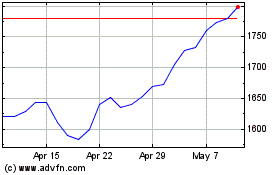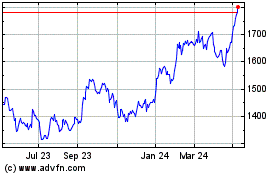Bayer, Versant Mount New Stem-Cell Venture -- WSJ
December 10 2016 - 3:02AM
Dow Jones News
By Christopher Alessi
FRANKFURT -- German pharmaceuticals giant Bayer AG and U.S.
health care investor Versant Ventures plan to establish a stem-cell
research company, marking the latest effort by a big pharmaceutical
company to develop new and innovative drugs by joining with venture
capital and biotechnology firms.
Executives at Bayer and Versant said in an interview that they
would launch the startup, to be called BlueRock Therapeutics, with
initial joint funding of $225 million. BlueRock plans to focus on
developing stem-cell therapies to regenerate heart muscles
following a heart attack and treatments for Parkinson's
disease.
The companies plan to formally announce the deal on Monday.
The agreement follows a wave of similar deals in the Big Pharma
sector. Companies including Sanofi SA, Johnson & Johnson and
GlaxoSmithKline PLC have been increasingly partnering with external
investors and then jointly outsourcing the research and development
of new technologies to smaller biotech outfits and academic
institutions.
But the Bayer and Versant agreement represents one of the
largest ever initial venture capital financing deals for a biotech
startup, according to Nooman Haque, the director of healthcare and
life sciences at Silicon Valley Bank's UK branch. "It's a monster,"
he said, noting that most original funding for biotech firms is an
average range of $10 million to $20 million.
The trend has accelerated in recent years as patents for many of
the industry's blockbuster drugs have begun expiring, putting new
pressure on companies to discover differentiating drugs, experts
say.
About 70% of the pharmaceutical industry's new sales come from
drugs that were originally developed in small companies, up from
30% in 1990, according to the Boston Consulting Group.
"We at Bayer were not so familiar with these new technologies
and needed a different spirit to really drive them to maturity,"
said Axel Bouchon, the head of Bayer's Life Science Center. Bayer
launched the center recently to develop innovative R&D
partnerships.
Mr. Bouchon said that the more dynamic environment of a biotech
firm would give the stem-cell experts the space to "solely focus on
the science."
The high risk of investing in newer technologies has made it
more necessary for pharmaceutical companies to form new
partnerships to share the burden of development, said Jerel Davis,
a managing director at Versant.
Mr. Davis said the broad range of experts and stakeholders
connected to the new firm would give it the "ability to pursue
multiple programs and bring some [new drugs] into clinic by
2018."
Versant is not new to collaborating with Big Pharma.
"More and more pharmaceutical companies have been approaching us
to do these kind of projects," said Bradley Bolzon, a managing
director at Versant. He said Versant had already partnered with
three other pharmaceutical companies on projects around the
"frontier" technologies of cell therapy and gene therapy.
Bayer was unique in establishing a brand new company to tackle
stem-cell technology, rather than joining forces with an existing
biotech firm or going it alone, Mr. Bolzon said.
BlueRock has licensed foundational stem cell intellectual
property from a Nobel Prize winning scientist at Kyoto University
and has begun to assemble a team of researchers through
partnerships with the Toronto-based McEwen Center for Regenerative
Medicine and Memorial Sloan Kettering in New York. The startup,
which will be based out of Toronto, New York and Boston, expects to
hire more than fifty employees within the next year and a half,
executives said.
Bayer's Mr. Bouchon and Versant's Messrs. Davis and Bolzon will
all initially serve on the BlueRock's board of directors.
The stem-cell biotech group is the second investment by the
Bayer Life Science Center. The unit last year established a joint
venture with gene-editing startup Crispr Therapeutics AG, a company
co-founded by Versant. That venture aims to use gene-editing
technology known as Crspir-Cas9 to find new drugs for conditions
such as hemophilia, heart disease in infants and a form of
blindness called Stargardt.
Mr. Bouchon said that both the Crispr and Versant endeavors
aimed to harness new medical technologies to push the
pharmaceutical industry to tackle "the challenge of moving from
treatments to cures."
Write to Christopher Alessi at christopher.alessi@wsj.com
(END) Dow Jones Newswires
December 10, 2016 02:47 ET (07:47 GMT)
Copyright (c) 2016 Dow Jones & Company, Inc.
Gsk (LSE:GSK)
Historical Stock Chart
From Mar 2024 to Apr 2024

Gsk (LSE:GSK)
Historical Stock Chart
From Apr 2023 to Apr 2024
